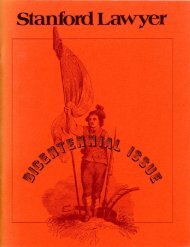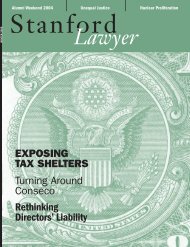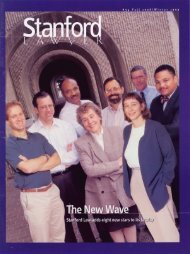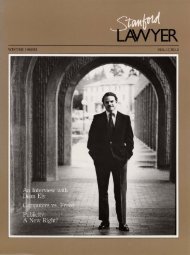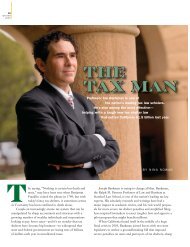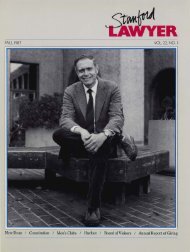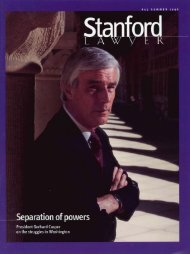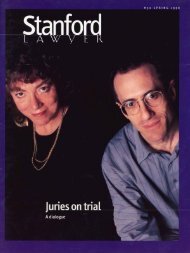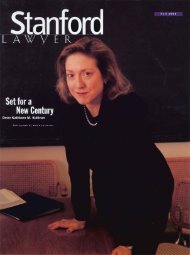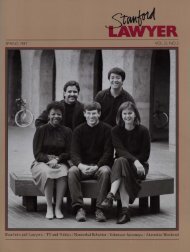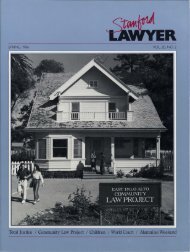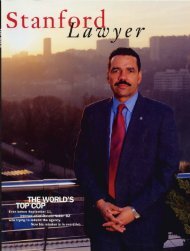Summer 1999 – Issue 55 - Stanford Lawyer - Stanford University
Summer 1999 – Issue 55 - Stanford Lawyer - Stanford University
Summer 1999 – Issue 55 - Stanford Lawyer - Stanford University
- No tags were found...
Create successful ePaper yourself
Turn your PDF publications into a flip-book with our unique Google optimized e-Paper software.
school and four years at the <strong>University</strong> ofVIrginia-where she became the first blackwoman ever to win the school's prestigiousPete Gray Award, and graduated Phi BetaKappa-Mills was pointing to the daywhen she would stand in front ofa jury andmake her case. Virginia School ofLaw offereda full scholarship, but she turned itdown to come to <strong>Stanford</strong>.During her first year at SLS, Millsmet professor Barbara Babcock, and her lifewas changed. "She had a tremendous impacton my desire to do defense work. Shereally made me think about how our legalsystem works; that it only works with bothsides being committed to their causes."Babcock, now the Judge John CrownProfessor ofLaw, remains a close friend andmentor. "She's my hero," said Mills.Emily Uhrig '91, a friend and schoolmateofMills at <strong>Stanford</strong> and now a deputyfederal public defender in Los Angeles,worked with Mills to organize a conferencefor women ofcolor studying the law. Uhrigwas and continues to be inspired by Mills'senergy and commitment. "Cheryl just getsthings done," she said. "If she sets hermind to doing something, she will do it.When Cheryl believes in something herargument comes through almost as truth."MILLS WAS introduced to theCo n gressmanTom Campbell voteson impeachmentHis Democratic constituentsOn December 15, 1998, the air in CaliforniaCongressman Tom Campbell's office was thick withanticipation. It also was thick with reporters, dozensof whom crushed into the room to hear Campbell, standing behind a massive bankof microphones, announce his decision on whether to support the impeachment ofPresident Clinton. Campbell was one of the last Republicans in the House to announcehis position, and his was viewed as a key vote in the final tally.Campbell's stance-that the President's testimony to the grand jury in thePaula Jones case amounted to perjury and was grounds for impeachment-cameat the end of a tortuous deliberation and at the risk, according to many analysts,of the <strong>Stanford</strong> Law School professor's political career.In the days leading up to his climactic press conference, Campbell faced adilemma-whether to follow the dictates of his constituents in his heavily Democraticdistrict or listen to his conscience and do what he felt was right. In the end,Campbell's integrity won out. "I couldn't do it any other way," Campbell told theSan Jose Mercury News following the vote. "It's just not right by me."Voters lobbied vigorously against impeachment. Candlelight vigils were heldoutside Campbell's office. On the day before his announcement, his staffers wereinundated with more than 1,000 calls from constituents, most of them opposingimpeachment, and Campbell went home that Monday night with a briefcase full ofe-mail messages. Despite his moderate political history and occasional break withconvention, Campbell's impeachment vote placed him in a tenuous political posi·tion. His last-minute decisionseemed to carry more weightthan those that had gone onthe record earlier, and madehim more vulnerable to attack.Beltway legal community duringan externship with thePublic Defender Service in Washington.After graduation, she joined Hogan &Hartson, one of the capital's premier lawfirms, and spent much of her two yearsthere on cases involving school desegregation,working with David Tatel, a formervisiting professor at the Law School and now a judge inthe D.C District Court ofAppeals.In early fall of1992, with polls showing Clinton far aheadofincumbent George Bush in the presidential race, Mills joinedthe transition team that would shepherd in the new administration.Still in her mid-20s, MiJls was helping craft ethics policiesfor Clinton's top advisers, and she regularly called on her<strong>Stanford</strong> professors for advice. Soon after Clinton was elect-were angry and said so.Campbell has not retreated,though, and insists thatvoters eventually will understandhis reasoning. "I thinkthe people of my district willjudge me fairly," he said.ed, she was named White House associate counsel, an extraordinaryappointment considering her age, says Babcock."She had only been out oflaw school for a couple ofyears.Whoever was responsible for the appointment-whether itwasthe President himself or Hillary Clinton or somebody elsetheysaw in her the special qualities of leadership and judgmentand something you might call 'moral force' that is very'1/\ 10RI) IA\\\'IR Q




